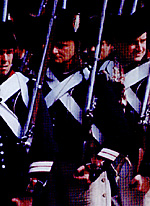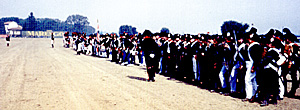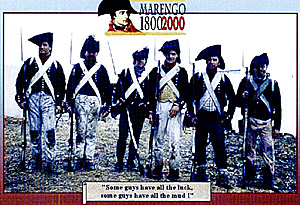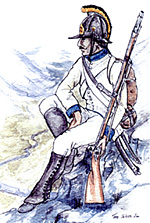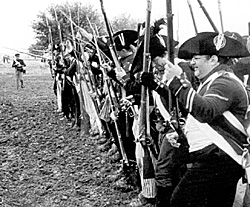Images of Marengo 1800/2000
Original Marengo Bulletins 1800
Re-enactors 2000
by Terry Crowdy UK
Artwork by Terri Juliens
Photos by Thomas Offermans
| |
This is how the news of Marengo reached the citizens of Paris. Marengo (14th June) was fought on the 25 Prairial Year VIII. Bulletin of the Armée d'Italie 26 Prairial, Year VIII After the battle of Montebello, the army was put on the march in order to cross the Scrivia. On the 24th the advanced guard, commanded by General Gardanne, encountered the enemy, who was defending the approaches to his three bridges near Alessandria, drove him back and captured two guns and 100 prisoners. At the same time General Chabran's division advanced along the Po to a point opposite Valenza to prevent the enemy crossing that river. Thus M. Melas found himself trapped between the Bormida and the Po. His sole line of retreat to Genoa remaining after the battle of Montebello was cut. The enemy appeared to have no plan and to be very uncertain of his movements. At dawn on the 25th, resolved to break out, he crossed the Bormida in force by his three bridges, surprised our advanced guard and with great ardour began the battle of Marengo, which has finally decided the fate of both Italy and the Austrian army.
Four times during the battle we were in retreat and four times we advanced. At different points and different times more than 60 guns were taken and retaken. There were more than 12 cavalry charges with varying success. At 3.00 p.m. 10,000 cavalry outflanked our right in this superb plain of San Giuliano. They were supported by a line of cavalry and much artillery. The Grenadiers of the guard were placed like a granite redoubt in the midst of this immense plain; nothing could breach it. Cavalry, infantry, artillery all were hurled at this battalion; but in vain. Then indeed one saw what a handful of brave men can do. This stubborn resistance held the left wing of the enemy and supported our right until the arrival of General Mounier, who took the village of castel Ceriolo at the point of the bayonet. The enemy cavalry then made a rapid movement against our left, which was already shaken; this attack precipitated its retreat. The enemy was advancing along the whole line and firing canister shot from over 100 guns. The roads were strewn with fugitives, wounded and debris. The battle appeared lost. The enemy was allowed to advance within musket range of the village of San Giuliano where General Desaix's division was drawn up in line of battle with eight light guns in front and two flanking battalions in close column on the wings. All the fugitives rallied behind. Already the enemy was making mistakes which foreshadowed catastrophe; he was overextending his flanks. The presence of the First Consul revived the moral of the troops. "My children," he addressed them,"remember it is my custom to make camp on the field of battle". To cries of "long live the republic! Long live the First Consul!" Desaix attacked the centre at the double. In a moment the enemy was thrown back. General Kellerman whose brigade of heavy cavalry had through out the day been covering the retreat of our left, made a charge so vigorous and well judged that 6000 grenadiers and General Xach, chief of the general staff, were taken prisoner, and several enemy generals killed. The whole army followed this movement. The right of the enemy became cut off; disorder and fear began to appear in his ranks.
The Austrian cavalry had moved to the centre in order to cover the retreat. Chef de Brigade Bessières, at the head of the grenadiers of the Guard, charged valiantly and pierced the line of enemy cavalry. This brought about the complete rout of the enemy army. We have taken 15 flags, 40 guns, and 6 to 8000 prisoners. More than 6000 of the enemy were killed. The 9è Légère have earned the title "L'Incomparable." The heavy cavalry and the 8eme dragons covered themselves in glory. Our losses have also been heavy: we have lost 600 men, 1500 wounded and 900 prisoners. General Champeaux, Mainoni and Boudet are wounded. The commander in chief, General Berthier, had his clothes riddled with bullets and several of his aides de camp were unhorsed. But a loss which is keenly felt by the army and will be so by the whole Republic closes our heart to joy. Desaix was struck by a bullet at the beginning of the charge of his division; he died instantly. He had time only to say to young Lebrun, who was with him; "Go tell the First Consul that I die regretting not having done enough to live in posterity". In the course of his life General Desaix had four horses killed under him and received three wounds. He had joined this headquarters only three days earlier. When, in the midst of the hottest fire, the news of his death was brought to the First Consul, there escaped him but these words; "Why am I not allowed to weep?" His body has been carried to Milan to be embalmed. Bulletin of the Armée d'Italie 28 Prairial, Year VIII The gunners of the Consular Guard cover themselves with glory in every action. At the battle of Montebello, with the tirailleurs and three guns, they were always within twenty paces of the enemy. Sous-lieutenant Marin, of that company, distinguished himself outstandingly. At the battle of Marengo M. Melas had two horses killed under him and his arm was crushed. General St.Julien, with four or five other generals was taken prisoner, but they had time to escape while our soldiers were seizing the guns.
Several Hungarian and German grenadier prisoners, who had been taken prisoner in the campaigns of the years IV and V, recognised the First Consul when passing near him. With a kind of satisfaction many of them began to shout; Long live Bonaparte! When he was returning and saw that inevitable aftermath of a great battle, a large number of wounded soldiers in distress and privation, the First Consul said; "When one sees all these brave fellows suffering one's only regret is not to be wounded too, so as to share their pain. The Austrian Generals, officers and soldiers are angry with Thugut. They respected the good intentions of their Emperor and seem convinced that we are fighting only to raise the price of English coffee and sugar. A distinguished Austrian General said at headquarters; "We shall have no peace and happiness on the continent until we all, with one accord, drive out that mercantile nation, which reckons to increase its commerce at the expense of our blood." They all seem certain that, if we do not have peace, it is the fault of England and its ministry… Bulletin of the Armée d'Italie 29 Prairial, Year VIII General Rivaud was wounded at the battle of Marengo while defending that village, where he held out with great courage for several hours. General Desaix had brought from Egypt two little negroes given him by the king of Dafur and these children are wearing mourning for the death of their master in a most touching way and in the manner of their country. The First Consul has taken for himself the two aides-de-camp of General Desaix, Savary and Rapp. The General's body has been taken by coach to Milan, where it has been embalmed. It is not yet known whether the First Consul will send it to Paris or will place it in a monument to be erected on the Saint Bernard to commemorate the crossing of the Armée de Réserve. General Desaix is the first European to carry the glory of the French name beyond the Cataracts. He was adored by the people of Upper Egypt, who called him the Just Sultan. He had a lively resentment of the ill-treatment he had received from Lord Keith who had loaded him with insults in a way unworthy of a European nation . . .
. . . . The French nation does well to be victorious. If it were to suffer reverses, there is no excess its enemies would not commit. But, thanks to the number and courage of its soldiers, it will triumph over them all, and opprobrium and the contempt of civilised nations will be the lot of men who behave like Lord Keith. This morning the First Consul attended a Te Deum sung in the cathedral of Milan in honour of the deliverance of the Republic and the glory of French arms. He was received at the door by all the clergy and conducted into the choir to a specially prepared dias, on which the consuls and first magistrates of the Empire of the West used to be received. The music of the te Deum was by the best composers of Italy. The ceremony was imposing and superb. This respect for the altar is a memorable event which will have an effect on the peoples of Italy and make more friends for the Republic…. NOTE: News of Marengo did not reach Paris until the 22nd June. Before the Bulletin of the 26th Prairial was printed en masse, a poster went up proclaiming: "VICTOIRE COMPLETE REMPORTEE PAR L'ARMEE DE RESERVE. PRISE DE QUARANTE PIECES DE CANON ET DE HUIT MILLE PRISONNIERS. ARMISTICE CONCLUE ENTRE LE GENERAL EN CHEF BERTHIER ET LE GENERAL AUTRICHIEN MELAS." Back to Table of Contents -- First Empire #54 Back to First Empire List of Issues Back to MagWeb Master Magazine List © Copyright 2000 by First Empire. This article appears in MagWeb (Magazine Web) on the Internet World Wide Web. Other military history articles and gaming articles are available at http://www.magweb.com |
